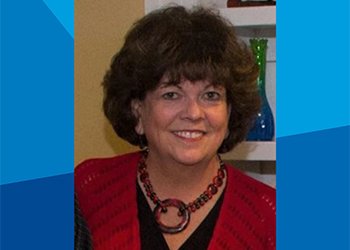Patient Story: A Tilt of the Heart

Christine Callahan, 66-year-old Burlington resident and former nurse with Lahey Hospital & Medical Center, had a routine chest x-ray with Carla Lamb, MD, Pulmonary & Critical Care Specialist, which revealed a large mass in her lungs. A couple days later, Dr. Lamb broke the news that Callahan had stage 3 lung cancer.
In January 2020, Callahan had surgery to remove her left lung where the cancer was located. After one month, she was still feeling short of breath. Her doctor told her not to worry, that she was only four weeks out from surgery and still deconditioned from chemotherapy and radiation - she just needed to give herself some time to heal and grow stronger.
Callahan kept on, hopeful for improvement. She would go for daily walks, stopping every three driveways to catch her breath. By June, she knew she wasn't progressing as she should be. She began trying to find reasons for her symptoms - healing from the surgery or chemo, struggling with the summer heat and the humidity - but deep down, she knew she should be feeling better by now.
Dr. Lamb requested that Callahan come in for an in-person visit. When she arrived at LHMC, she began losing consciousness as she stepped up to the registration desk. Her oxygen levels were dangerously low. She was admitted immediately and sent for a CT scan. The pulmonary team began their tests and work ups to prove her right lung was functioning correctly. It was then that a third year pulmonary fellow, Ahmed Agameya, MD, mentioned that her heart, not her lung, may be the issue.
'"l'll never forget it. This pulmonary fellow, Dr. Agameya, kept saying, 'Something tells me it's not your lung. I think we need to involve cardiology.' I love the fact that when you're at Lahey, you get the whole team. Everyone is right there," Callahan shared.
Pulmonary and cardiology began working together, trying to get to the bottom of what was causing Callahan's extreme shortness of breath. While monitoring her at night, they noticed her breathing difficulties subsided - both on and off oxygen. However, as soon as she was sitting up or began walking, the issues returned.
Then, something clicked. Their previous tests had been done when Callahan was laying down, so they returned to the lab and had her lay down and pull her knees to her chest as if she were marching to mimic walking or sitting up. They could finally see there was a problem. A cardiac MRI confirmed their suspicions. Callahan had a hole in her heart.
"I'm a nurse and I knew that your lung and your heart are connected, but I hadn't thought of it. In all the years I took care of heart disease in the ER, I noticed women don't present the same as men and they don't think of being short of breath as something that can be related to your heart."
When Callahan's left lung was removed, the shifting of her organs tilted her heart - a very rare occurrence. This tilt caused her oxygenated and deoxygenated blood to mix through a preexisting hole. However, when she laid down, the valve shifted into place to stop the mixing which is why she didn't experience the shortness of breath at night or lying down on the exam table.
"It was a long journey, but I have to say, cardiology and pulmonary not giving up on me and just sending me home made all the difference."
On her tenth day in the hospital, Callahan had a procedure to repair the opening in the valve led by Gautam Gadey, MD. The surgery was successful!
"Shortly after I was brought up from recovery to my room, my surgeons asked if I wanted to walk to prove the repair worked. They held my hand and as my daughter watched, she saw me smiling as I realized I was breathing normal with no oxygen. The gift of breath! I will always remember the next morning after I woke up, [Sonu Abraham, MD, Cardiology Fellow] asked me if she could listen to my heart. When she listened, she looked me right in the eye and said, 'That's music to our ears.' Those were the perfect words."
On day 12, Callahan was able to go home. Currently, she's cancer free and breathing well - enjoying having the ability and energy to keep up with her five grandchildren!
Her advice to other people who may be experiencing symptoms: don't hesitate.
"As a patient, you should be persistent. If you feel like there's something wrong, you need to speak up. No symptom is a nonsense symptom! Show up to the doctor or the ER and let them decide. That's what I did and it saved my life."
February is American Heart Month. Learn more about Cardiovascular Medicine, Pulmonary & Critical Care, and the Women's Heart Center at LHMC.
